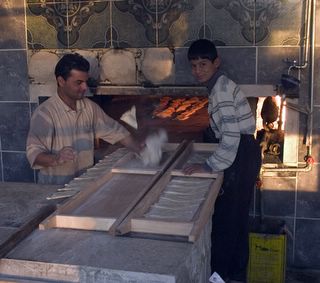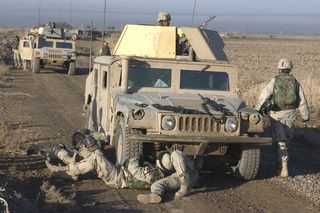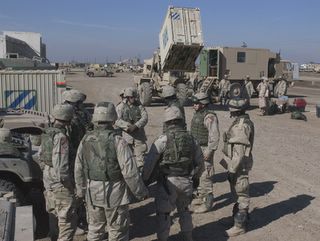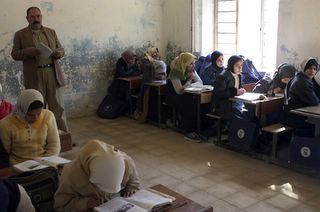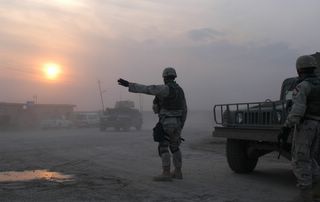Sunday, February 27, 2005
Soldiers say things - in anger or fear or frustration - they don’t mean, and feel things they can’t or won’t say. They personify insurgents as "haji" - a singular name used as a collective noun - like Charlie from another war in another place and time. It embodies respect for their enemy’s skills at sudden violence, and the contempt fighting men have - perhaps must have - for their enemy. How else could they kill instantly when need arises? At the same time, living in Iraq for a year, seeing the reality of the Third World - the grinding poverty, the living conditions of daily life, the absence of what Americans and the rest of the West and some of the developing world take for granted - clean water, security, schools, civil rights, health care, opportunity - has had a profound impact on the mostly young Americans who joined the army for a host of reasons. It has hardened a few to human suffering, but in most it has kindled or reinforced a sense that Americans are among the most fortunate people on Earth. In many, it has sparked kindness. Soldiers here are almost universally good - maybe in small ways - to the Iraqi kids who flock around them. The kids have come to associate soldiers with candy and soccer balls and pictures, rather than with fear and violence.
Friday, February 25, 2005
Thursday, February 24, 2005
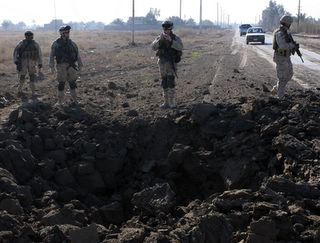
(c) Roger Leo
Members of the Mortar Platoon of Dawg/HHC Co., 1-8 Cav., check out a bomb crater made when a 500-pound bomb went off the night before as an Abrams M1 tank went past. The bombs ... improvised explosive devices, or IEDs ... are the scariest and most dangerous threat to daily patrols in Baghdad.
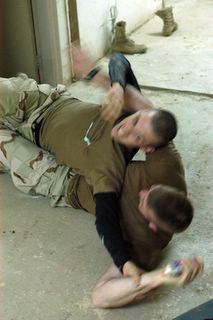
(c) Roger Leo
Spc. Hunter B. Perry, 22, of Kingston, Okla., and Sgt. Thomas J. Rollins, 22, of Pottsboro, Texas, wrestle over a can of silly string to work off steam after a mission as the days wind down to the end of 1-8 Cav's year-long deployment in Iraq. The two soldiers have served together in Iraq for a year, and the horseplay ended in laughter.
Better to be lucky ...
"I have to have my leaving-the-gate cigarette," said Pvt. Eric T. Cobb, 27, of Salina, Kansas, lighting up with one hand while driving his uparmored M1114 Humvee with the other and looking over his shoulder like a New York cabbie. "The only times we've gotten hit is when I haven't had it. I have to have it ... like his lucky frog." He was referring to the toy frog carried by Sgt. Thomas J. Rollins, 22, of Pottsboro, Texas. Powers are ascribed to the strangest things. In one truck, soldiers have a small green plastic GI on top of the radio, crawling forward over the commo equipment, rifle in one hand, alert for danger. It's the kind that children have played with for generations. Other soldiers don't say things because they believe it will jinx them. They don't talk about their good luck to date, or say that they haven't been hit on a particular road, or that things are quiet. Some even came to believe that a reporter visiting them for a few weeks was a good luck token, and were happy to have him in their trucks.
Tuesday, February 22, 2005

(c) Roger Leo
Three Americans died Monday on Senators -- Iraqi Highway 5. They were new guys -- had just arrived from the States for their year in Iraq. They were driving from the main American base around BIAP -- Baghdad International Airport, a strange name for a landing field with planes to almost nowhere -- to Forward Operating Base Falcon, to zero -- sight in -- their weapons. A Humvee crashed off the road, flipped over and three MPs inside were injured. Bandit Co., 1-8 Cav rushed to the accident. A medevac helicopter landed on the other side of the highway, and as the wounded MPs were being carried to it, a bomb exploded right next to them. The bomb had evidently been hidden in an old tire. The three injured MPs were killed, and eight other soldiers were wounded, four of them seriously. A medic has lost his leg, another soldier, a platoon sergeant, is out of action for the rest of his deployment. They and two others, including a medic on the first helicopter, had to be airlifted to the CSH -- Combat Surgical Hospital -- in the Green Zone. Blood and wreckage covered the highway. Cars were stopped in all directions. People watched quietly, somberly from around the neighborhood. From time to time, soldiers fired bursts from their weapons. Soon nobody was outside except the Americans. Soldiers covered the broken bodies with tarps, then placed them in body bags, then carried the bags to an ambulance. Soldiers poured water on the blood and swept it with brooms, then shoveled dirt onto the residue. Soldiers picked up every scrap of debris they could find. “It’s not supposed to be like this,” one said. “Not this close to going home.” Metternich, the 19th century German statesman, said, “The Balkans are not worth the life of a single Pomeranian grenadier.” Iraq has taken the lives of 1,539 American soldiers. One thousand five hundred thirty-nine Amercans, as of March 25. A higher price by far than Metternich was willing to pay for pursuit of empire in another land.
Monday, February 21, 2005

(c) Roger Leo
Soldiers from 1-8 Cav and the 3rd Infantry Division rest for a moment after a long day of searching houses, farm fields, date palm groves and reeds. From left, Pvt. Eric T. Cobb, 27, of Salina, Kansas, 1-8 Cav.; Sgt. Corey J. Coffelt, 24, of Jackson, Mich., with 3rd ID; Sgt. Jason L. Cook, 22, of Inverness, Fla., 3rd ID; Sgt. Thomas J. Rollins, 22, of Pottsboro, Texas, 1-8 Cav.; Sgt. Thomas L. Mentes, 35, of Fort Stewart, Ga., 3rd ID; and Spc. Jairo Melgar, 31, of the Bronx, 1-8 Cav. Besides looking for weapons, the Scouts of 1-8 Cav. were teaching the 3rd Infantry soldiers about the area, which 3rd ID is taking over as the Cav's year-long deployment comes to an end.
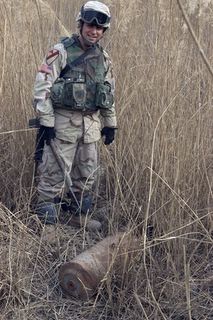
(c) Roger Leo
Sgt. Michael J. Nashif Jr., 27, of Newberg, Ore. found this 200-lb. bomb during a search Saturday for weapons caches. "I was walking up a little spider trail like this one," Sgt. Nashif said, pointing to a side track off a beaten-down path through the reeds, "and found it." The bomb was old, rusty and unimpressive looking. But when EOD ... the bomb squad ... came and blew it up, the explosion was loud and powerful.

(c) Roger Leo
After their dismounted patrol Saturday night, troopers from the COLT Platoon, Dawg/HHC Co., 1-8 Cav. took part in house raids in a remote part of Baghdad along the Tigris River. The raids resulted in the detention of several Iraqis who showed signs of explosives on their hands when soldiers tested them.

(c) Roger Leo
Spc. Steven M. Bradshaw, 22, of Pittsburgh, Pa., serving in the Mortar Platoon, Dawg/HHC Co., 1-8 Cav., loads his M16 while driving out the gate of Forward Operating Base Falcon in southern Baghdad Saturday morning. Weapons are locked and loaded on leaving the FOB, cleared when entering.

(c) Roger Leo
Spc. Stephen C. Fraim, 20, of Sheridan, Ark., a soldier in the COLT Platoon of Dawg/HHC Co., 1-8 Cav., mans an M240 machine gun atop his Humvee while other members of his squad are out of the truck. The gunner ... who can have the M240, or a 50-calibre machine gun, or a Mark 19 grenade launcher ... always stays in place when soldiers leave the heavily armored vehicles. An Apache attack helicopter flies overhead.
Sunday, February 20, 2005
Tidbits of soldier talk
“It’s bad when you say this is a good bomb because it’s only a 120mm,” one soldier said the other day.
Later, from another trooper whose truck was in a convoy hit by a deeply buried IED ... improvised explosive device: “One guy said, ‘They buried it too deep.’ I said, ‘There’s no such thing as too deep, you dumb ass. They didn’t bury it deep enough.’ ”
From yet another: "It's pretty bad when you start joking about stuff like, 'You dumb asses, you set it off too soon. If you'd waited 10 seconds, you'd have blown us all up.' It's bad."
Sudden death is no joking matter, yet soldiers here in Iraq joke away merrily, nonstop. It's one way they deal with the constant pressure, apprehension and fear, and still go outside the wire.
Later, from another trooper whose truck was in a convoy hit by a deeply buried IED ... improvised explosive device: “One guy said, ‘They buried it too deep.’ I said, ‘There’s no such thing as too deep, you dumb ass. They didn’t bury it deep enough.’ ”
From yet another: "It's pretty bad when you start joking about stuff like, 'You dumb asses, you set it off too soon. If you'd waited 10 seconds, you'd have blown us all up.' It's bad."
Sudden death is no joking matter, yet soldiers here in Iraq joke away merrily, nonstop. It's one way they deal with the constant pressure, apprehension and fear, and still go outside the wire.
Friday, February 18, 2005

(c) Roger Leo
Soldiers of the Mortar Platoon, Dawg/HHC Co., 1-8 Cav, eat a late meal after getting in at 4:15 a.m. Friday from a patrol that began at 9 p.m. the evening before. The Mortars were introducing soldiers from the 3rd Infantry Division to the southeastern section of Baghdad that is their patrol sector. The 3rd ID is taking over from 1st Cav, which is preparing to head home after its one-year deployment. Much of the night was spent providing security as Army engineers set up concrete barriers for several checkpoints along area roads. They missed midnight chow, but found made-up cafeteria plates of spaghetti and chicken waiting when they returned to their barracks.

(c) Roger Leo
COLT Platoon of Dawg/HHC Co., 1-8 Cav, talks about plans for its patrol through southeastern Baghdad early Friday morning. 1st Lt. Michael P. Lennox. 25, of Fort Worth, Texas, COLT Platoon leader, showed the sector to 1st Lt. Andrew J. Mounce, 24, a 3rd Infantry Division soldier from Huntington, N.Y., and two of his men. The 3rd ID will take over coverage of the sector when 1st Cav comes home next month.

(c) Roger Leo
1st Lt. Michael P. Lennox, 25, of Fort Worth, Texas, left, and 1st Lt. Andrew J. Mounce, 24, of Huntington, N.Y., talk with Iraqi security guards at Baghdad's sewage treatment plant, one of the three prime pieces of infrastructure in the area of Baghdad that 1-8 Cav is handing over to 3rd Infantry Division. The other two? The al-Dora power plant and the oil refinery. 1st Lt. Lennox is COLT Platoon leader for Dawg/HHC Co., 1-8 Cav; 1st Lt. Mounce is with Bravo Co., 6-8 Cav attached to the 3rd ID. American commanders say the change is happening in the wake of the election, at the same time that Iraqi forces are taking more responsibility for security in the city.
Thursday, February 17, 2005

(c) Roger Leo
Sheep surround a Humvee parked on a dirt farm road in southern Baghdad Thursday morning. The COLTS of Dawg/HHC Co., 1-8 Cav patrol a sector of Baghdad that includes farms with fields and flocks, and has established relationships with many of the farmers and shepherds. "We don't get hit," Spc. Kenneth R. Kragie said. "They know us, they know our trucks, and we don't get hit here. It's because of the way we treat them."

(c) Roger Leo
Sgt. 1st Class Jeff A. Mallo, 36, of Akron, Ohio, left, talks with 1st Sgt. Anthony M. Wagner, 40, of Pittsburgh, Pa., about his patrol Wednesday night. Sgt. Mallo was out with the Mortars of Dawg/HHC Co. 1-8 Cav. when another company's patrol ran into an IED. The Mortars went to the bombing, called in backup, helped care for the three injured Americans, and drove them to a hospital in the Green Zone.

(c) Roger Leo
A trooper from 1-8 Cav stands in the blast hole left by a bomb -- an improvised explosive device, or IED -- set off at the side of a secondary road in Baghdad Wednesday night. The force of the blast, which hit a patrol of uparmored 1114 Humvees, sent the closest truck crashing off the road and through a cement block wall. Three soldiers were injured -- not severely -- and were taken to a hospital -- the CSH, or Combat Surgical Hospital --. in the Green Zone. IEDs and car bombs -- vehicle borne improvised explosive devices, or VBIEDs -- are the most deadly weapons used by the Iraqi insurgents against U.S. troops, other coalition forces, and Iraqi security forces. Since the war began in 2003, more than 1,450 American soldiers have been killed.

(c) Roger Leo
Soldiers from Mortar Platoon, Dawg/HHC Co. 1-8 Cav check houses in a rural section of Baghdad Wednesday night. The search of houses ... mud-walled farms and new brick homes ... turned up a few illegal weapons, which the soldiers took. The Mortars trained back in the States to fire mortars, but in Iraq have learned how to search homes, set up traffic checks, establish a network of informants, and many other tasks more often linked to police work than soldiering.
Monday, February 14, 2005
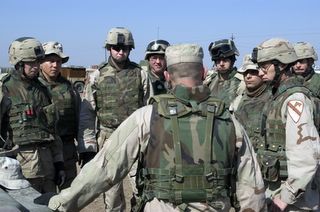
(c) Roger Leo
Staff Sgt. Travis J. Palmer, 31, of Plattsburgh, N.Y., holds a squad briefing before the Scout Platoon of Dawg/HHC Co. 1-8 Cav head out on patrol. The soldiers talk about what they will do, the route they will take, order of march, and what they wil do things fall apart. This day's mission ... to deliver backpacks to a school, and to deter rocket and mortar fire aimed at Baghdad's Green Zone. The first involves lots of happy kids; the second entails hours of sitting and watching.
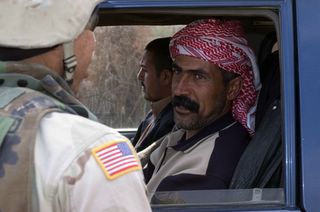
(c) Roger Leo
1-8 Cav trooper stops a car at a TCP -- traffic control point -- to check ID cards and cargo. Soldiers spend their days in mundane routine, interrupted at times by bombings and short, sharp firefights. The challenge often is staying alert through hours of incredibly boring stuff, to be ready if things go south in a rush.
Sunday, February 13, 2005

(c) Roger Leo
Spc. Jairo M. Melgar, 31, of the Bronx, N.Y., with the Scouts of Dawg/HHC Co. 1-8 Cav. patrols a rural road in Baghdad, next to a burned-out billboard promising a new Iraq.
---
I am not a soldier, but I am living with soldiers, and sharing their lives. Day after day for a year, the men of 1-8 Cav have patrolled Iraq, driving through city streets and rural roads. Everytime they go off the FOB -- Forward Operating Base Falcon in Baghdad -- they are targets for attack from small arms fire, snipers, bombs, grenades, rockets and mortars. So far, seven troopers in the battalion have died in combat and scores have been wounded. They are men, doing men's work, carrying weapons in a land where they are strangers to everyone but each other. In this savage place each truly holds the lives of the others in his hands. Most of them are young -- 19, 20, 25 years old -- living together in barracks that run out of water, where the toilets never all work, where the air conditioners break in summer, where it's noisy, and from where there is no escape. For them, this is it. They talk about the things soldiers have talked about across time on campaigns far away: home, girlfriends, their weddings, the birth of their children, food and favorite restaurants, friends, school, summer jobs, dogs, cars, getting drunk at Fort Hood, sliding into second base, their grandfather's farm. They talk about their time in Iraq, how they convoyed up from Kuwait, how they were hit hard by the insurgents when they first arrived, how they learned to fight a new kind of war. And every day they go outside the wire, never knowing when a bomb will blow up underneath their truck, or when a car loaded with explosives will drive into them and go off, or when any of the other horrors of war will visit them. They come back to the FOB, and eat the same food they have eaten for a year, and live in barracks with the same people they have lived with for a year. The soldiers are family to each other in a place where there is no other. But real as this is, they have a deeper reality to which they cling. They all dream of home, of girlfriend or wife, and it becomes in a way the center of themselves. This center is what allows them to go out every day and put themselves in harm's way. Being a soldier is their job, they chose it and they do it, but when they are safe, they long for their real home back in the world, and the person who waits there. Those who have been to war will understand. And those who love them should.
Saturday, February 12, 2005
Friday, February 11, 2005

(c) Roger Leo
Staff Sgt. Rene M. Maldonado of San Antonio, Texas, with the Scouts of Dawg/HHC Co. 1-8 Cav. shows digital pictures to Iraqi boys he just photographed. Soldiers and kids make friends around the world. Why is that? The Scouts were on patrol to prevent rocket fire into the International Zone -- or Green Zone as people still call it -- where government and foreign business activity is based. (Why change the name? If one place is green, the rest must be red, right?) On their way back to Forward Operating Base Falcon, the soldiers passed one bombing scene which still smoldered, and talked about another bombing earlier in the day that hit a Humvee of Alpha Co. 1-8, damaging the vehicle but not badly injuring the soldiers inside.
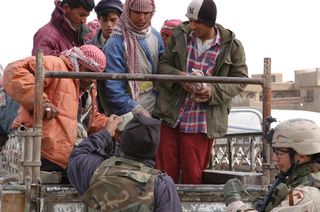
(c) Roger Leo
Scouts from Dawg/HHC Co. 1-8 Cav stop a truck filled with young men to check ID cards. Work and travel in Iraq remain tough. Security is a worry, unemployment is high especially at the top of the scale, travel anywhere in the country is difficult
and dangerous, yet people go on with daily life here.
Thursday, February 10, 2005

(c) Roger Leo
Thursday, Feb. 10. Back from a 16-hour patrol. Tired. Smelly. Ravenous. 1st Cav troopers, Marines and Iraqi National Guardsmen ... 240 men riding in 40 Humvees, Abrams tanks and Bradleys ... swept through an area 40 kilometers outside Baghdad. Two IEDs ... improvised explosive devices (or road bombs) hit the convoy on the way in. Nobody was hurt. The soldiers spent the day raiding houses and searching fields along the Euphrates river. They found 27 rockets ... 17 with warheads ... and blew them up in one big boom. Up at 1:30 a.m., rolling at 2:30, back at 6:30 p.m.
Wednesday, February 09, 2005
On to Baghdad
On Monday, a C-130 Hercules cargo plane carried a full load of passengers and baggage from Kuwait to Baghdad. Two-thirds of the people on board were military, the rest civilian contractors and a group of American cops who had signed up to train the Iraqi police. In 90 minutes, the plane flew over ground that had taken three weeks of heavy fighting to cover, between the invasion of Iraq on March 19, 2003 and the fall of the capital on April 9. From the air, little trace of the war was visible. In Baghdad, a hot zone landing reminded passengers that fighting goes on. To avoid weapons fire from the ground, the plane dove steeply and circled tightly over Baghdad International Airport before coming in for a fast landing and quick stop. Passengers sat on body armor. They clung to webbing to keep from being thrown about during the descent. They looked at one another in a mixture of amusement and anxiety. The rear cargo ramp opened as the aircraft taxied off the runway. The smell of burning rubber from the roughly used tires filled the plane.
Sunday, February 06, 2005
What a world
Safe in Kuwait! Two long flights ... Boston to Heathrow (a chance to drink tepid tea in a smokey cafe), then Heathrow to Kuwait. On the flight from London, seats on either side held a Canadian man who had been born in Kuwait to Lebanese Christian parents, and a Palestinian woman who was married to a Kuwaiti who had been born in Basra. The Canadian was 23 and extremely idealistic, seeing justice as the route to peace in the Middle East. The Palestinian was 37 and figured fighting was the natural order of things. For her people it has been. The 14-hour flights plus three-hour layover in London bludgeon the mind into stupor.
Wednesday, February 02, 2005
Back to Baghdad
Liftoff for Iraq on Saturday. and it's happening again -- a narrowing and sharpening of focus, a sense of normal things falling away, perspective shifting, a feeling of picking up speed on a trajectory that leads back to Baghdad and the war. Back to the war that has killed thousands -- Americans and Iraqis -- in a land where millions have just shown they are ready to run things by voting in the face of the terror that has hung over their country since Saddam Hussein was toppled. This election may not be the Berlin Wall coming down -- but it feels close.


